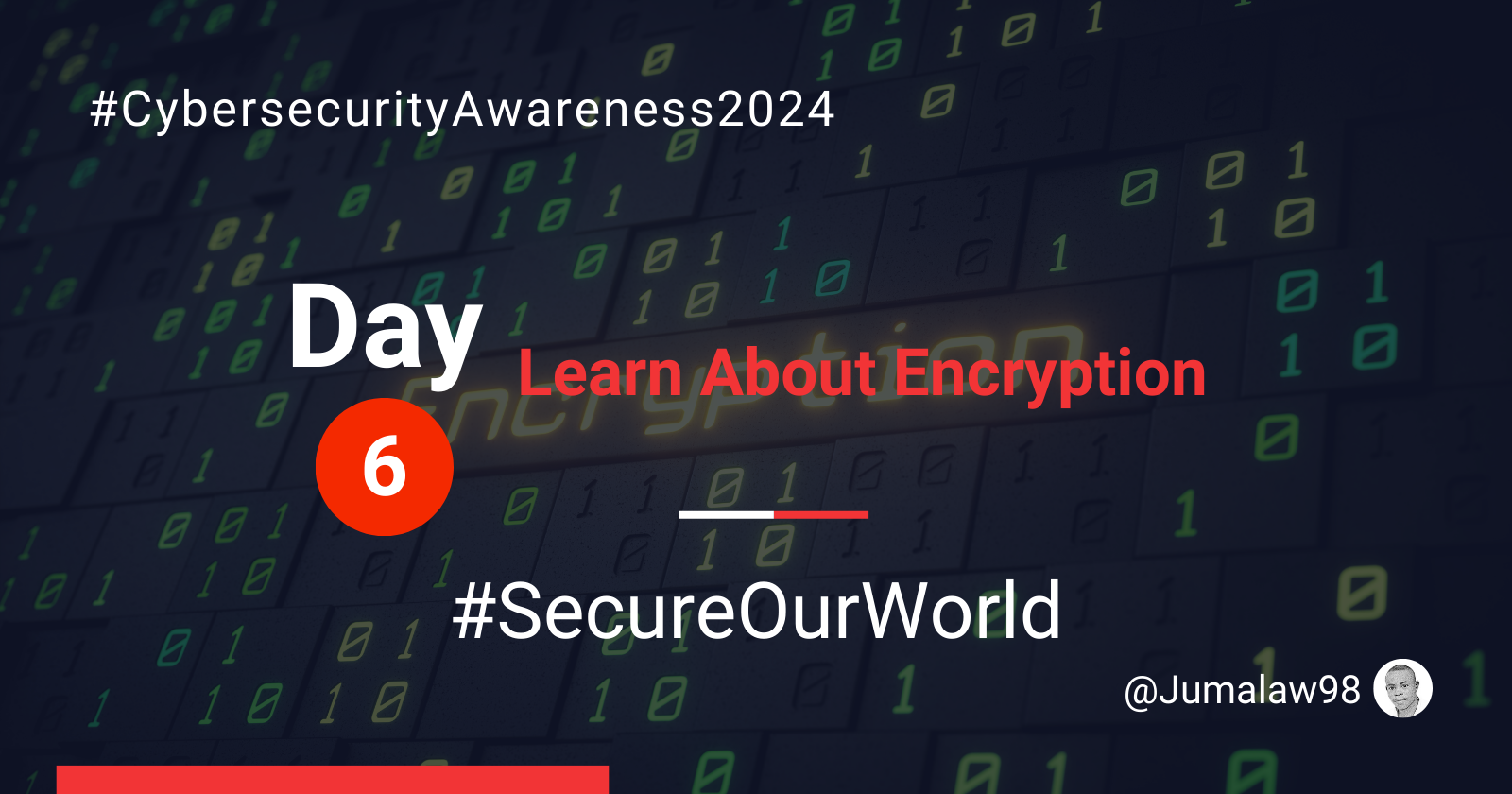Day 6 - Learn About Encryption
 Lawrence Juma "Jumalaw98"
Lawrence Juma "Jumalaw98"
Things are moving on well, it's day 6 of #cybersecurityawarenessmonth 2024.
In our rapidly evolving digital world, it's really important to make sure our sensitive data is safe and sound. Our financial transactions and personal communications are constantly zipping around online, so how do we keep them private and secure? Well, that's where encryption comes in—it's like the superhero of modern cybersecurity, keeping our data safe from prying eyes.
The theme of this year’s #CybersecurityAwarenessMonth, "Secure Our World", understanding and implementing encryption is a critical step in reducing risks and protecting sensitive information. let's delve into the workings of encryption, its various types, and why it’s crucial for ensuring the security of our data in today’s digital landscape.
What is Encryption?
Encryption is the technique of transforming data or information into a coded format so that unapproved people cannot read it. It turns ordinary text into “ciphertext,” which is only decodable by an individual who possesses the necessary decryption keys. The security of digital data, whether it is being sent over networks or stored on a server, is frequently safeguarded via encryption.
Assume you're sending a message that's been encrypted. Without the right key, all that's visible to someone who intercepts the communication is a string of characters. The message can only be unlocked and its contents viewed by the individual who has the correct key.
Let's get to the juicy part!
How Encryption Works
Encryption scrambles and unscrambles data using mathematical methods and keys. This is a basic explanation of how it functions:
- Plaintext: The original, legible information or message that you wish to keep private. An encryption algorithm is a mathematical procedure that converts plaintext into ciphertext.
- Encryption Key: The technique encrypts and decrypts the message using a unique piece of data (a string of bits).
- Ciphertext: The data that has been jumbled and rendered unintelligible by the encryption process.
- Decryption Key: The key required to transform the ciphertext back to plaintext.
Encryption, for instance, will jumble the contents of a sensitive email so that only the intended recipient—holding the right decryption key—can read it. It is still impossible to read the email without the key.
Types of Encryption
There are two main types of encryption: symmetric encryption and asymmetric encryption.
1. Symmetric Encryption
With symmetric encryption, the data is encrypted and decrypted using the same key. The same secret key must therefore be accessible to both the sender and the recipient. Since anyone with access to the key can decrypt the data, it must be shared securely.
- Advantages: Symmetric encryption is fast and efficient for encrypting large amounts of data.
- Disadvantages: The challenge lies in securely sharing and managing the secret key, as it can be intercepted.
Example: The Advanced Encryption Standard (AES) is one of the most widely used symmetric encryption algorithms, trusted by governments and institutions for securing sensitive data.
2. Asymmetric Encryption
Asymmetric encryption, also known as public-key encryption, uses two keys: a public key for encryption and a private key for decryption. The public key is available to anyone, but the private key remains secret and is only known by the recipient. This eliminates the need to share a secret key between parties.
- Advantages: Asymmetric encryption is more secure for key exchange because the private key is never shared.
- Disadvantages: It’s slower than symmetric encryption and requires more computational power.
Example: RSA (Rivest-Shamir-Adleman) is a popular asymmetric encryption algorithm used for secure data transmission, including in applications like email encryption and SSL/TLS for web traffic.
Why Encryption for Protecting Sensitive Data
Encryption plays a critical role in ensuring data privacy and security. Here's why it’s essential for both individuals and organizations:
1. Privacy of Data
Sensitive information is protected from unauthorized users using encryption. Encryption jumbles data to prevent unwanted access, whether it's private information like social security numbers or corporate secrets.
2. Information Security
Encryption ensures that data hasn't been altered during transmission, which helps preserve data integrity in addition to keeping it secret. Hashing techniques are used in several encryption systems to ensure that the data received matches the data transmitted.
3. Adherence to Rules
Strict data protection laws like the GDPR (General Data Protection Regulation) and HIPAA (Health Insurance Portability and Accountability Act) apply to a wide range of businesses, including government, healthcare, and finance. In order to comply with these regulations, encryption is frequently necessary, which helps businesses avoid paying heavy fines.
4. Defense Against Online Attacks
Cybercriminals are always searching for new methods to pilfer confidential information. Even if hackers are successful in intercepting encrypted data, they will be unable to exploit the stolen material unless they have the decryption key. Even if hackers, phishers, or malware get to access intercepted data, encryption makes it far more difficult for them to profit from it.
5. Communication Security
Encryption guarantees the security of all communications, including text messages, video calls, and emails. End-to-end encryption is used by programs such as WhatsApp and Signal to guarantee that messages can only be read by the sender and the recipient.
6. Safeguarding Information in the Cloud
Encryption is essential to make sure that cloud service providers and possible hackers cannot access your files as more data is kept on cloud servers. Encryption is a feature that many cloud storage companies, like Dropbox and Google Drive, provide to protect content uploaded to their servers.
Encryption in Everyday Life
You may not realize it, but encryption is part of your daily life, working behind the scenes to protect your personal information. Here are a few common examples:
- Banking: When you access your bank account online, your connection is secured with SSL/TLS encryption, indicated by the padlock symbol in your browser’s address bar.
- Messaging: Apps like WhatsApp and Signal use end-to-end encryption to protect your conversations from prying eyes.
- Shopping Online: When you enter your credit card details to make an online purchase, encryption ensures that your financial information is securely transmitted.
- Email: Services like Gmail and Outlook use encryption to protect your emails while they’re being transmitted.
How to Use Encryption to Secure Your World
In keeping with this year’s theme, "Secure Our World", encryption is one of the most effective ways to protect your digital life. Here’s how you can use encryption in your daily routine:
Enable Encryption on Your Devices: Most smartphones, laptops, and tablets have built-in encryption features. For example, enable FileVault on macOS or BitLocker on Windows to encrypt your device’s hard drive.
Use Encrypted Messaging Apps: Switch to messaging apps that offer end-to-end encryption, such as WhatsApp, Signal, or Telegram.
Secure Your Cloud Storage: Ensure that your cloud provider uses encryption to protect your data. For extra security, consider encrypting your files before uploading them using third-party encryption tools.
Encrypt Your Emails: Use email services that support encryption, or install plugins like PGP (Pretty Good Privacy) for secure email communication.
Always Look for HTTPS: When browsing the web, always look for websites with HTTPS (Hypertext Transfer Protocol Secure) in the URL. This indicates that the site uses SSL/TLS encryption to protect your data.
Encryption is super important for keeping our data safe and making sure our info stays private. As we use more and more digital tech in our daily lives, understanding and using encryption is key to keeping everything secure.
Whether you're just looking out for yourself or you're a company protecting customer info, encryption should be a big part of your cybersecurity plan. So, take some time to learn about encryption, and let's work together to make the online world safer and more secure.
#CyberSecMonth2024 #DataPrivacy #OnlineSecurityTips #Encryption101 #SecureYourData
Subscribe to my newsletter
Read articles from Lawrence Juma "Jumalaw98" directly inside your inbox. Subscribe to the newsletter, and don't miss out.
Written by

Lawrence Juma "Jumalaw98"
Lawrence Juma "Jumalaw98"
Growth mindset in the tech field, Front-end "React Js, Vue Js", Project Manager, Digital Marketer.

